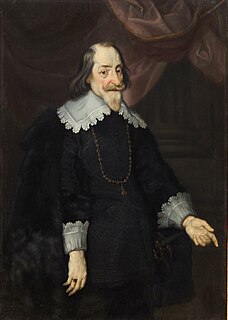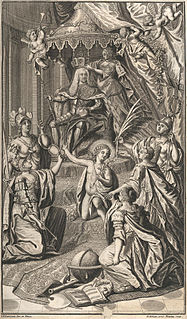Aftermath
Ferdinand III acceded to the throne on his father's death on February 15, 1637 and was crowned on November 18.
The imperial election of 1636 was an imperial election held to select the emperor of the Holy Roman Empire. It took place in Regensburg on December 22.
This was the sixth imperial election to take place during the Reformation. On October 31, 1517, Martin Luther, a professor of moral theology at the University of Wittenberg, now part of the Martin Luther University of Halle-Wittenberg, had delivered the Ninety-five Theses to Albert of Brandenburg, the elector of Mainz. This list of propositions criticized the practice of selling indulgences, remissions of the punishment meted out for sin in Purgatory. Luther's criticism snowballed into a massive schism in the church, and from there into a split among the states of the empire.
The accession of the fiercely Catholic Ferdinand II, Holy Roman Emperor as king of Bohemia led to unrest among the Protestant estates of the kingdom. On May 23, 1618, a group of members of the Protestant estates threw two of Ferdinand II's representatives from the third story of Prague Castle in an event known as the Defenestration of Prague. On August 26, 1619, the full Bohemian estates declared Ferdinand II deposed. They offered the throne to Frederick V of the Palatinate, elector of the Electoral Palatinate, who accepted.
Ferdinand II called on Maximilian I, Elector of Bavaria, duke of Bavaria and leader of the Catholic League, a political confederation-cum-military alliance, for help suppressing the Bohemian Revolt and removing Frederick. In a treaty of October 21, he promised the Upper Palatinate and its electoral rights in exchange for this help. At the Diet of Regensburg on February 25, 1623, the Duchy of Bavaria received the Palatine electoral dignity, to be returned on Maximilian's death.
On May 30, 1635, the Peace of Prague was signed, ending the conflict between the Holy Roman Empire and its Protestant states. However, the larger war in Germany, the Thirty Years' War, which involved other great powers in Europe, continued.
Ferdinand II called for the election of his successor. In addition to Maximilian, the electors called to Regensburg were:
Of these, only the elector of Saxony was Lutheran and only the elector of Brandenburg was Calvinist.
Ferdinand III, Ferdinand II's eldest son, was elected.
Ferdinand III acceded to the throne on his father's death on February 15, 1637 and was crowned on November 18.

The prince-electors, or electors for short, were the members of the electoral college that elected the emperor of the Holy Roman Empire.

Ferdinand II was Holy Roman Emperor, King of Bohemia, Hungary, and Croatia from 1619 until his death in 1637. He was the son of Archduke Charles II of Inner Austria and Maria of Bavaria. His parents were devout Catholics, and, in 1590, they sent him to study at the Jesuits' college in Ingolstadt because they wanted to isolate him from the Lutheran nobles. In July that same year (1590), when Ferdinand was 12 years old, his father died, and he inherited Inner Austria–Styria, Carinthia, Carniola and smaller provinces. His cousin, the childless Rudolf II, Holy Roman Emperor, who was the head of the Habsburg family, appointed regents to administer these lands.

Frederick V was the Elector Palatine of the Rhine in the Holy Roman Empire from 1610 to 1623, and reigned as King of Bohemia from 1619 to 1620. He was forced to abdicate both roles, and the brevity of his reign in Bohemia earned him the derisive sobriquet "the Winter King".

The Catholic League was a coalition of Catholic states of the Holy Roman Empire formed 10 July 1609. While initially formed as a confederation to act politically to negotiate issues vis-à-vis the Protestant Union, modelled on the more intransigent ultra-Catholic French Catholic League (1576), it was subsequently concluded as a military alliance "for the defence of the Catholic religion and peace within the Empire".

The Protestant Union, also known as the Evangelical Union, Union of Auhausen, German Union or the Protestant Action Party, was a coalition of Protestant German states. It was formed on 14 May 1608 by Frederick IV, Elector Palatine in order to defend the rights, land and safety of each member. It included both Calvinist and Lutheran states, and dissolved in 1621.

Maximilian I, occasionally called the Great, a member of the House of Wittelsbach, ruled as Duke of Bavaria from 1597. His reign was marked by the Thirty Years' War during which he obtained the title of a Prince-elector of the Holy Roman Empire at the 1623 Diet of Regensburg.

The Bohemian Revolt was an uprising of the Bohemian estates against the rule of the Habsburg dynasty that began the Thirty Years' War. It was caused by both religious and power disputes. The estates were almost entirely Protestant, mostly Utraquist Hussite but there was also a substantial German population that endorsed Lutheranism. The dispute culminated after several battles in the final Battle of White Mountain, where the estates suffered a decisive defeat. This started re-Catholisation of the Czech lands, but also expanded the scope of the Thirty Years' War by drawing Denmark and Sweden into it. The conflict spread to the rest of Europe and devastated vast areas of Central Europe, including the Czech lands, which were particularly stricken by its violent atrocities.

The Diet of Regensburg of 1623 was a meeting of the Imperial States of the Holy Roman Empire convened by Holy Roman Emperor Ferdinand II. The meeting was not technically an imperial diet in the full sense, but a convention of princes or Deputationstag – a looser constitutional format giving the emperor greater leeway to take decisions without being bound by formal procedures. At it the Electorate of the Palatinate was transferred to Maximilian I of Bavaria. The meeting marked the high-water mark of imperial power during the Thirty Years' War.
The imperial election of 1531 was an imperial election held to select the emperor of the Holy Roman Empire. It took place in Cologne on January 5.
The imperial election of 1562 was an imperial election held to select the emperor of the Holy Roman Empire. It took place in Regensburg on November 28.
The imperial election of 1575 was an imperial election held to select the emperor of the Holy Roman Empire. It took place in Regensburg on October 27.

The imperial election of 1612 was an imperial election held to select the emperor of the Holy Roman Empire. It took place in Frankfurt on June 13.
The imperial election of 1619 was an imperial election held to select the emperor of the Holy Roman Empire. It took place in Frankfurt on August 28.
The imperial election of 1653 was an imperial election held to select the emperor of the Holy Roman Empire. It took place in Augsburg on May 31.
The imperial election of 1658 was an imperial election held to select the emperor of the Holy Roman Empire. It took place in Frankfurt on July 18.
The imperial election of 1690 was an imperial election held to select the emperor of the Holy Roman Empire. It took place in Augsburg on January 23.
The imperial election of 1711 was an imperial election held to select the emperor of the Holy Roman Empire. It took place on October 12.

The imperial election of 1742 was an imperial election held to select the emperor of the Holy Roman Empire. It took place in Frankfurt on January 24. The result was the election of Charles Albert of Bavaria, the first non-Habsburg emperor in hundreds of years.
The imperial election of 1764 was an imperial election held to select the emperor of the Holy Roman Empire. It took place in Frankfurt on March 27.
The imperial election of 1790 was an imperial election held to select the emperor of the Holy Roman Empire. It took place in Frankfurt on September 30.